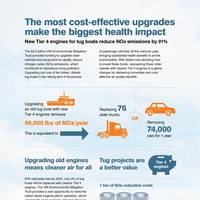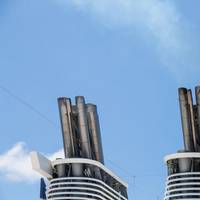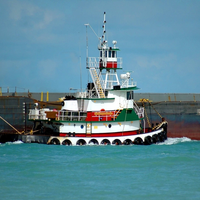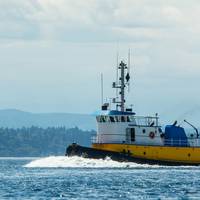BY THE NUMBERS: Replace your Workboat Engine (now)

New Research Doubles Service Life Estimate of Marine Workboat Engines, Reveals Big Opportunities for Diesel Emissions Reductions.It turns out that commercial workboat engines are staying in service more than two times longer than predicted by the U.S. Environmental Protection Agency (EPA), according new research from the Diesel Technology Forum (DTF) and Environmental Defense Fund (EDF). That says a lot for the quality of marine engines, but at the same it isn’t necessarily a good thing.
DTF: Longer Workboat Engine Life Impacts Environment

New Research Doubles Service Life Estimate of Marine Workboat Engines, Reveals Big Opportunities for Diesel Emissions Reductions. New Research also Underscores Cost-Effective Opportunity to Upgrade to New Diesel Engines and Reduce Emissions for Vulnerable Communities. Commercial workboat engines, which are essential for maritime commerce, are staying in service more than two times longer than predicted by the U.S. Environmental Protection Agency (EPA), according to new research from the Diesel Technology Forum (DTF) and Environmental Defense Fund (EDF).
Tug, Switcher Engine Upgrades Offer Most Cost-Effective Options

Clean diesel technology upgrades for large tug and switcher locomotive engines cost only $4,379 to $15,201 per ton of nitrogen oxides (NOx), compared to more than $30,000 per ton of NOx for many other diesel emission reduction projects. The Diesel Technology Forum (DTF) and the Environmental Defense Fund (EDF) has released a report documenting the significant emission reduction benefits that can be gained by replacing older engines in tug boats and switcher locomotives with the latest clean diesel models.
EPA Provides $650K for Diesel Engine Refits

The U.S. Environmental Protection Agency (EPA) is providing the Puget Sound Clean Air Agency (PSCAA) with $650,000 to reduce diesel emissions from engines on up to eight vessels operating in the Puget Sound region. The project will provide vessel owners with incentives to scrap and replace 12-19 old Tier 0 engines with newer, more-efficient and lower-emission Tier 3 engines on six to eight harbor vessels operating in Puget Sound, Lake Union and Lake Washington. Combined with the mandatory match of $891,000, the total project cost is $1,541,000.
Los Angeles, Long Beach Ports Update Clean Air Action Plan
As the Ports of Los Angeles and Long Beach (POLA/POLB) begin final consideration of their updated 2017 Clean Air Action Plan, regulators must embrace the future role of diesel technology in the global goods movement sector and the substantial, immediate clean air and climate benefits that the latest clean diesel technologies offer. Because of its unique combination of power, performance, efficiency, reliability, durability and availability, diesel power is projected to remain the dominant technology for global goods movement on land and sea for the next period covered by this plan. The newest generation of clean diesel technology achieves near-zero levels of emissions for nitrogen oxides and particulate matter…
EPA Grants for Diesel Tech
The U.S. Environmental Protection Agency’s Regions 9 and 10 have announced a regional competition through the West Coast Collaborative, for more than $5 million to deploy verified or certified clean diesel technologies. The EPA is encouraging all qualified applicants to submit proposals for funding now. It’s part of an initiative to significantly reduce diesel emissions in Alaska, Arizona, California, Hawaii, Idaho, Nevada, Oregon, Washington, and the U.S. Pacific Islands. "We have to accelerate air quality improvements,” said Deborah Jordan, Air Division director for the U.S. EPA’s Pacific Southwest region. “One of the most cost-effective ways to do that is by modernizing our legacy diesel fleet.





